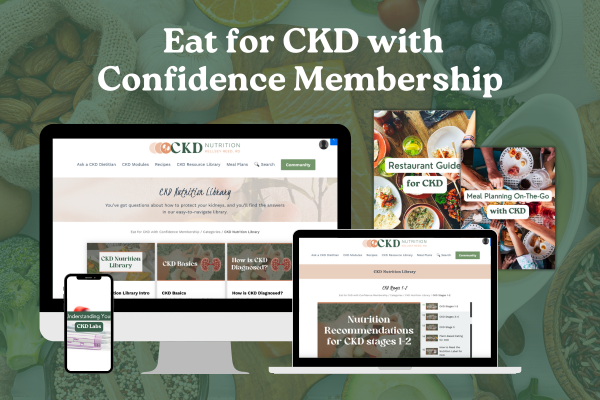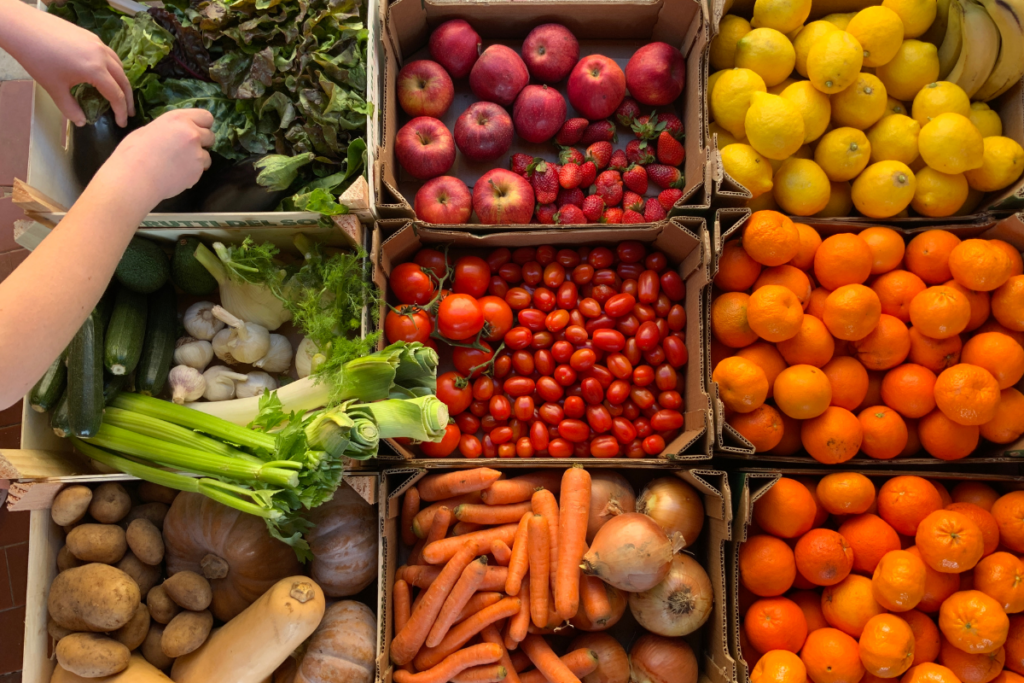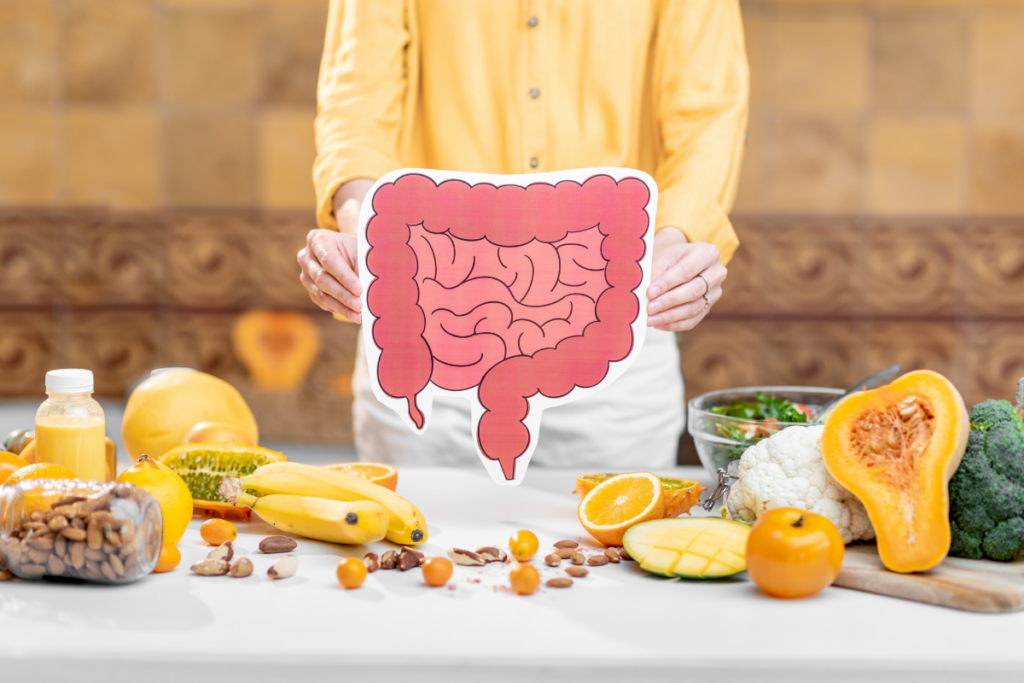categories
I am a Registered Dietitian Nutritionist that specializes in chronic kidney disease. I am dedicated to giving those in the kidney community the best support possible!
I'm Kellsey
This quick and easy guide will show you CKD-friendly meals you can order while on-the-go and also give you quick, frozen meal ideas, too!
Freebie
Plant-Based Diet for Kidney Disease: Tailor Your Nutrition to Labs & Lifestyle

December 19, 2024
Navigating a diet for kidney disease can be overwhelming. Your doctor hands you a one-page list of “foods to avoid,” and suddenly your favorite meals feel off-limits. This outdated and overly restrictive advice focuses more on eliminating foods than creating a sustainable, nutrient-rich lifestyle. But kidney health isn’t one-size-fits-all. The truth is, your dietary needs depend on your unique labs, medical history, and lifestyle.
In this guide, you’ll discover how a plant-based approach to a diet for kidney disease, tailored to your specific needs, can empower you to manage kidney disease with confidence.
Why Traditional Diets for Kidney Disease Fall Short
For decades, people with chronic kidney disease (CKD) were told to follow a generic “renal diet.” This advice often includes avoiding foods high in potassium, phosphorus, and sodium. While the intentions were good, the science has evolved, and so should your diet. Here’s why the traditional approach may not work for you:
1. Unnecessary Restrictions
Not everyone with CKD has elevated potassium or phosphorus levels. Yet, the standard list eliminates nutrient-dense foods like bananas, potatoes, and nuts, even when they’re perfectly safe for many people. This leads to needless anxiety, nutrient deficiencies, and food fear.
2. Misunderstanding Phosphorus
The outdated advice treats all phosphorus sources the same. However, your body absorbs phosphorus additives from processed foods more easily than natural phosphorus from whole foods. For example, only 30-60% of phosphorus from beans and nuts is absorbed, compared to over 90% from additives.
3. Missing the Bigger Picture
A “don’t eat this” list overlooks the importance of whole, nutrient-dense foods, blood sugar control, and plant-based proteins. It ignores the flexibility and nuance needed for a sustainable and enjoyable kidney-friendly lifestyle.
4. Promotes Food Fear Instead of Empowerment
The constant focus on what not to eat leaves people feeling stressed and uncertain about their diet. A better approach emphasizes the foods you can eat while teaching you how to modify recipes and portions to fit your needs.
Why Choose a Plant-Based Diet for Kidney Disease?
A plant-based diet offers numerous benefits for kidney health. Not only does it reduce the workload on your kidneys, but it also supports other critical health factors like gut health, inflammation, and cardiovascular health.
Benefits of Plant-Based Eating for CKD
- Lower Protein Burden
Animal protein creates more waste products like urea and uric acid, which kidneys must filter. Plant-based proteins, like beans and lentils, are easier on your kidneys. - Rich in Nutrients
Fruits, vegetables, and whole grains are packed with vitamins, minerals, and antioxidants that fight inflammation and oxidative stress. - Potassium and Phosphorus Flexibility
With proper portion control and lab monitoring, high-potassium foods like bananas and sweet potatoes can still fit into many CKD diets. Plus, plant-based phosphorus is less bioavailable, making it safer. - Improved Gut Health
Fiber-rich plant foods promote a healthy gut microbiome, which can reduce toxin buildup in the blood—a major concern for CKD patients.
What Does “Plant-Based” Mean?
It’s not about going vegan or vegetarian unless that aligns with your preferences. A plant-based diet focuses on increasing plant-derived foods—fruits, vegetables, legumes, nuts, seeds, and whole grains—while minimizing animal products. This approach offers flexibility, making it easier to adopt as a lifestyle.
Structuring a Plant-Based Plate for a Kidney-Friendly Diet
Here’s how to structure a plant-based diet for kidney disease to maximize nutrient intake while protecting your kidneys:
- Half the Plate: Vegetables
Opt for low-potassium veggies like zucchini, bell peppers, and cauliflower. High-potassium options can be included if your labs allow. - Quarter Plate: Whole Grains or Starchy Veggies
Brown rice, quinoa, or sweet potatoes provide energy and fiber. Stick to half-cup portions if monitoring potassium or phosphorus. - Quarter Plate: Plant-Based Protein
Choose beans, lentils, or tofu. These foods provide protein without overloading your kidneys. - Add Healthy Fats
Avocado, olive oil, or a handful of nuts can boost flavor and satiety.
Gut Health’s Role in a Diet for Kidney Disease
Your gut health is intricately linked to your kidney health, making it a crucial focus when planning a diet for kidney disease. The gut microbiome—a collection of trillions of bacteria in your digestive system—plays a pivotal role in reducing inflammation, managing waste products, and supporting overall health. For those with chronic kidney disease (CKD), a balanced gut can slow disease progression and improve quality of life.
How the Gut Impacts Kidney Health
When your kidneys aren’t functioning properly, toxins and waste products build up in your blood. These toxins, like urea and indoxyl sulfate, can originate from the gut. Poor gut health exacerbates this issue by allowing these harmful byproducts to proliferate. Conversely, a healthy gut microbiome can help neutralize these toxins, reducing their impact on the kidneys.
Additionally, a compromised gut microbiome can increase the risk of inflammation and cardiovascular issues, both of which are common complications for people with CKD. By nurturing your gut with the right foods, you can reduce systemic inflammation and support overall health.
The Role of Fiber
Fiber is essential for maintaining a healthy gut and reducing toxin buildup in CKD. Foods rich in dietary fiber, like fruits, vegetables, legumes, and whole grains, feed the beneficial bacteria in your gut. These bacteria produce short-chain fatty acids (SCFAs), which have anti-inflammatory properties and promote kidney health.
For example:
- Soluble Fiber: Found in oats, apples, and lentils, this fiber type supports blood sugar control and gut health.
- Insoluble Fiber: Found in leafy greens and whole grains, it promotes regular bowel movements, essential for toxin elimination.
A fiber-rich diet not only improves digestion but also helps balance potassium levels. Regular bowel movements can help regulate potassium, especially for those with CKD who are concerned about high levels.
Prebiotics and Probiotics: Building a Resilient Gut
Prebiotics
Prebiotics are non-digestible fibers that serve as food for beneficial gut bacteria. Common sources include:
- Garlic
- Onions
- Bananas
- Asparagus
Adding prebiotics to your diet can enhance the growth of good bacteria, improving your gut’s ability to manage toxins.
Probiotics
Probiotics are live bacteria that help restore balance in your gut. Research shows they can reduce blood urea nitrogen (BUN) levels, a key marker of kidney health. Foods rich in probiotics include:
- Dairy-free yogurt
- Fermented foods like kimchi and sauerkraut
- Miso and tempeh
Specialized probiotics like Renadyl, formulated specifically for CKD, have been shown to help lower toxin levels and support kidney function.
Tips for Improving Gut Health in a Diet for Kidney Disease
- Increase Fiber Gradually: Rapid increases in fiber can cause bloating or discomfort. Introduce fiber-rich foods like lentils, beans, and whole grains slowly and pair them with adequate water intake.
- Limit Processed Foods: These can disrupt the gut microbiome and contribute to inflammation. Stick to whole, minimally processed foods when possible.
- Stay Hydrated: Proper hydration supports digestion and bowel movements, critical for toxin elimination. Tailor your fluid intake to your doctor’s recommendations.
- Focus on Plant-Based Eating: A plant-based diet is naturally high in gut-friendly fibers and nutrients that support a balanced microbiome.
- Experiment with Fermented Foods: If your sodium levels allow, incorporate small amounts of fermented foods like miso or unsalted sauerkraut to boost probiotics.
The Connection Between Gut Health and Inflammation
A healthy gut microbiome reduces systemic inflammation, which is vital for people with CKD. Chronic inflammation can accelerate kidney damage, so nurturing your gut with anti-inflammatory foods—such as berries, leafy greens, and flaxseeds—can protect your kidneys.
By supporting your gut health, you’re not only improving digestion but also addressing the root causes of many CKD-related complications. A well-functioning gut can help manage toxins, balance electrolytes, and reduce the overall burden on your kidneys.
Prioritizing gut health is a powerful way to enhance the effectiveness of a diet for kidney disease. By incorporating fiber, prebiotics, and probiotics into your meals, you can create a healthier, more resilient gut microbiome, paving the way for improved kidney function and overall wellness.
Sample Plant-Based Meal Plan for a Kidney-Friendly Diet
Curious about what a typical day on a plant-based diet for kidney disease looks like? Here’s a sample meal plan to inspire your daily meals:
Breakfast
- Scrambled tofu with spinach and bell peppers
- Half a grapefruit (if potassium is not restricted)
Lunch
- Quinoa salad with roasted chickpeas, arugula, and lemon-tahini dressing
- A side of sliced cucumbers
Snack
- Apple slices with almond butter
Dinner
- Lentil curry with steamed cauliflower rice
- A side of roasted carrots
Dessert
- Fresh berries with a dollop of coconut yogurt
Struggling with What to Eat for CKD? Join the Eat for CKD with Confidence Membership

If you feel overwhelmed by CKD nutrition, you’re not alone. That’s exactly why I created Eat for CKD with Confidence—a membership designed to help you eat well, protect your kidneys, and feel in control of your health.
- Get expert guidance from a renal dietitian—so you never have to guess what’s safe to eat.
- Enjoy CKD-friendly meal plans and recipes that make grocery shopping and cooking simple.
- Understand your labs and learn how nutrition can help improve them.
- Feel confident in your food choices, knowing they’re right for your kidneys.
Inside, you’ll get exclusive access to my best resources, meal plans, and support—all in one easy-to-follow program.
Ready to take control of your kidney health?
Click here to join Eat for CKD with Confidence today!
See you inside!
Leave a Reply Cancel reply
categories
I am a Registered Dietitian Nutritionist that specializes in chronic kidney disease. I am dedicated to giving those in the kidney community the best support possible!
I'm Kellsey
This quick and easy guide will show you CKD-friendly meals you can order while on-the-go and also give you quick, frozen meal ideas, too!
Freebie
© CKD Nutrition LLC, 2022-2025 | Branding by Jenn Baswick + Site Design by Jessica Gingrich | Privacy Policy | Terms of Use

